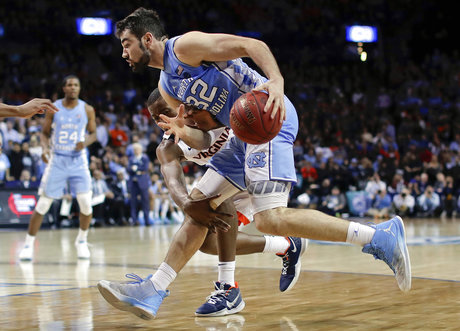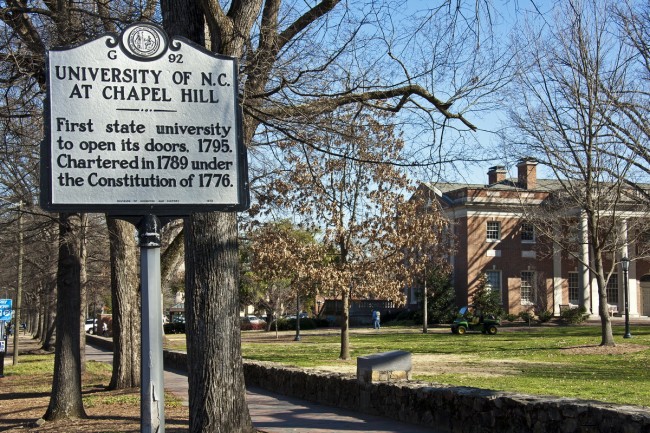North Carolina again faces an NCAA charge for providing improper extra benefits tied to its multi-year academic fraud scandal.
The school on Thursday released a third Notice of Allegations (NOA) from the NCAA that outlines rules violations. The notice, dated Dec. 13, includes rewording a charge that had been removed from the first version filed in May 2015 that was tied to athletes’ access to the irregular courses on the Chapel Hill campus. That charge, originally tied to conduct by academic counselors, now focuses on two former staffers in that department while also citing them for violating “principles of ethical conduct.”
It also restores a reference to football and men’s basketball players using problem courses to help maintain eligibility, which was removed before the second version filed in April. UNC has faced five top-level charges in all three versions, including lack of institutional control, though a charge of failure to monitor from the second notice was incorporated within the institutional-control charge in the third notice.
UNC had appeared before an infractions committee panel in October solely to discuss procedural arguments it had made in response to the second NOA. The school also released a Nov. 28 letter from the NCAA in response to that hearing, notifying UNC that the panel had instructed the enforcement staff to revisit the charges to review whether they “are alleged in a fashion to best decide this case.”
Athletic director Bubba Cunningham said in a conference call on Thursday that the school had “serious concerns” about a process he said “has gotten off track.”
“I have to admit I’m surprised and disappointed by the entire third NOA,” Cunningham said. “Again, I have never seen three notices on the same case. And the charge of the enforcement staff is to investigate and properly assess the facts to bylaws, and to have such a moving target is confounding to me.”
UNC had challenged the NCAA’s jurisdiction and said its accreditation agency was the proper authority to handle academic issues as part of its procedural arguments leading to the October hearing. Part of those issues also dealt with how much information should be used from a 2014 investigation conducted by former U.S. Justice Department official Kenneth Wainstein into the problems in the formerly named African and Afro-American Studies (AFAM) department.
Wainstein’s report focused on courses requiring only a research paper or two while offering GPA-boosting grades, with many misidentified as lecture courses that didn’t meet. Wainstein estimated more than 3,100 students were affected between 1993 and 2011, with athletes across numerous sports accounting for roughly half the enrollments.
Three other charges in the third notice remained unchanged, one tied a former women’s basketball academic counselor providing improper help on assignments and one for each of the former AFAM staffers most directly linked to the irregularities for failing to cooperate in the NCAA probe.
Related Stories
‹

UNC Hosting Regional to Open NCAA TournamentUNC baseball entered the ACC Tournament on the bubble to host a regional to open the NCAA Tournament, but a conference title solidified Carolina’s place as a host. The Tar Heels will open NCAA Tournament play in Chapel Hill and will be joined by second-seeded Tennessee, No. 3 seed Liberty and fourth-seeded UNC – Wilmington. […]

Inside Carolina: The Next ChallengeConference play is never easy, but the Tar Heels are looking to build some confidence in this weekend’s contest against Louisville. Today’s edition of “Inside Carolina” talks over the current state of the UNC basketball team, their performance in the season so far and their prospects looking ahead.
![]()
Hatchell Gets Win No. 1,000North Carolina women’s basketball coach Sylvia Hatchell is now part of an exclusive club of basketball coaches with 1,000 career wins. Hatchell reached the milestone with a victory over Grambling State in Myrtle Beach, South Carolina, on Tuesday afternoon. Of the 1,000 victories, 728 have come while Hatchell was at the helm in Chapel Hill. […]
![]()
Ex-UNC Player’s Estate Sues ACC, NCAA Over ConcussionsRepresentatives of a former North Carolina football player’s estate are suing the Atlantic Coast Conference and the NCAA, saying they ignored the dangers of concussions and it led to Ryan Hoffman’s death. Sandra LaMountain and Noah Hoffman brought the 39-page lawsuit on behalf of Ryan Hoffman’s estate and filed it Wednesday in U.S. District Court […]
![]()
October 2017 Community Forum: UNC Athletics Post NCAA InvestigationLongtime writer Art Chansky, WCHL host Aaron Keck and UNC professor Deb Stroman broke down the news and talked about what lies ahead for the university.

No Penalties for UNC in NCAA InvestigationThe conclusion of a years-long NCAA investigation left UNC unscathed on Friday. The NCAA announced Friday morning that the Division I Committee on Infractions “could not conclude that the University of North Carolina violated NCAA academic rules when it made available deficient Department of African and Afro-American Studies ‘paper courses’ to the general student body, […]

UNC Finally Set to Learn Ruling in NCAA Academic Case FridayNorth Carolina is finally set to learn its fate in a multiyear NCAA academic case. The NCAA infractions committee panel handling the school’s multiyear academic case plans to release its ruling Friday, three people with knowledge of the investigation said. The people said the NCAA notified parties involved in the case Thursday morning. They spoke […]

AP Sources: NCAA to Release Ruling in UNC Case FridayThree people with knowledge of the investigation say the NCAA infractions committee panel handling North Carolina’s multi-year academic case plans to release its ruling Friday. The people say the NCAA notified parties involved in the case Thursday morning. They spoke to The Associated Press on condition of anonymity because neither the school nor the NCAA […]

UNC: School Still Awaiting NCAA Ruling in Academic CaseNorth Carolina says it is still awaiting a ruling from an NCAA infractions committee panel handling the school’s multi-year academic case. In a statement Thursday, UNC spokesman Joel Curran says the school hasn’t received the public report that would include any potential penalties. Curran says it won’t come Friday due to “scheduling circumstances,” but didn’t […]
![]()
After Hearing, UNC Now Awaits NCAA Ruling in Academic CaseNorth Carolina has wrapped up a two-day hearing with an NCAA infractions committee panel that will decide whether the school faces penalties tied to its multi-year academic scandal. Now the case goes into yet another holding pattern. School officials spent much of Wednesday in a closed-door meeting with committee members in Nashville, Tennessee. They returned […]
›




